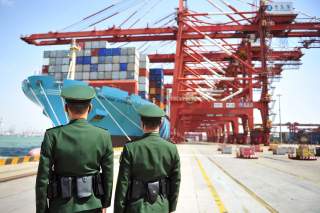China Nukes Qualcomm—NXP Deal, Escalates ‘Trade War’
A bitter Beijing is ready to fight Washington and win the trade war.
On Wednesday, Qualcomm Inc., the world’s leader in mobile-phone chips, announced the abandonment of its bid to buy Dutch-based NXP Semiconductors.
The $44 billion deal, which would have been the semiconductor sector’s biggest takeover ever, had to be scrapped because Beijing, escalating the so-called “trade war” with the United States, withheld approval.
In withholding approval, Chinese leader Xi Jinping made clear that it’s not possible to bargain with his country at this time. America now has no choice but to fight Beijing to the end.
San Diego-based Qualcomm needed regulators in nine markets to OK the deal. The company obtained all of the approvals necessary except that of China’s State Administration for Market Regulation. That agency’s officials had tentatively given their go-ahead.
A few weeks ago, therefore, observers were optimistic that Beijing would approve the acquisition. Some believe that to seal the deal, Trump had directly intervened to provide relief to China’s embattled ZTE Corp., the telecom equipment manufacturer, which had been caught violating Iran and North Korea sanctions.
The Commerce Department in April had imposed a seven-year ban on U.S. parties transferring technology or products to ZTE, essentially a death sentence. Trump, over stiff bipartisan opposition, forced the department to reduce the penalty to allow ZTE to remain viable.
“Some U.S. government and industry officials had expected the ZTE efforts would prompt China to reciprocate and approve the Qualcomm-NXP deal,” the Wall Street Journal reported Wednesday. Bloomberg noted Trump’s “personal intervention” was perceived to be “a prerequisite to Chinese approval” of the Qualcomm transaction.
Xi, however, pocketed the concession Trump gave him and nixed Qualcomm’s bid anyway. To add injury to insult, Xi’s move will cost the firm a $2 billion cancellation fee.
Qualcomm has not been Xi’s only target in recent weeks. In a similar situation, Larry Kudlow, the director of President Donald Trump’s National Economic Council, suggested last week at CNBC’s Delivering Alpha event that China’s ruler had refused to approve a trade deal with Washington. “I do not think President Xi at the moment has any intention of following through on the discussions we’ve made,” he said, referring to fruitful negotiations with Liu He, China’s point man in the trade talks. “I think Xi is holding the game up.”
Blocking Qualcomm of course further dents China’s reputation in antitrust matters. Yet there is a greater cost for Beijing. “It’s not just a trade war anymore,” Eswar Prasad of Cornell University told the Wall Street Journal in connection with Qualcomm’s scrapping the NXP purchase. “It’s becoming a more open economic conflict between the two countries.”
Prasad is right. And China, under Xi’s direction, now appears it cannot be appeased or reasoned with, a country that either will not or cannot reciprocate. If concessions, like Trump’s ZTE reprieve, do not work,then there is no sense in making them. If there is no sense in making them, then the struggle with Beijing will soon become an all-out fight.
That all-out fight will not end well for ZTE, whose reprieve has not yet to become final.
The fight also will not end well for China’s Huawei Technologies. In April, the Justice Department started an investigation into that company’s dealings with Iran.
Finally, the fight will not end well for the People’s Republic of China itself, especially now that the Chinese economy is stagnant, its currency is tumbling against the greenback, and its equity markets are among the world’s worst performers. At the same time, America’s economy looks resurgent, at full employment.
Moreover, Beijing faces more than just America. With the surprise trade concessions the EU made on Wednesday, Brussels now looks like it will end up on Trump’s side. Soon, the American president will have stitched together what Kudlow calls “the trade coalition of the willing.”
China has just killed an acquisition and nuked its relationship with the U.S. at the same time. For four decades, Washington’s policymakers believed it was in America’s interest to support the Communist Party, sometimes even at the expense of Americans. Yet that view has now become untenable, in part because the norms of give-and-take no longer apply in Xi Jinping’s China.
Gordon G. Chang is the author of The Coming Collapse of China. Follow him on Twitter @GordonGChang.
Image: Police officers are seen in front of a cargo ship with containers at a port in Qingdao, Shandong province, China April 6, 2018. REUTERS/Stringer

